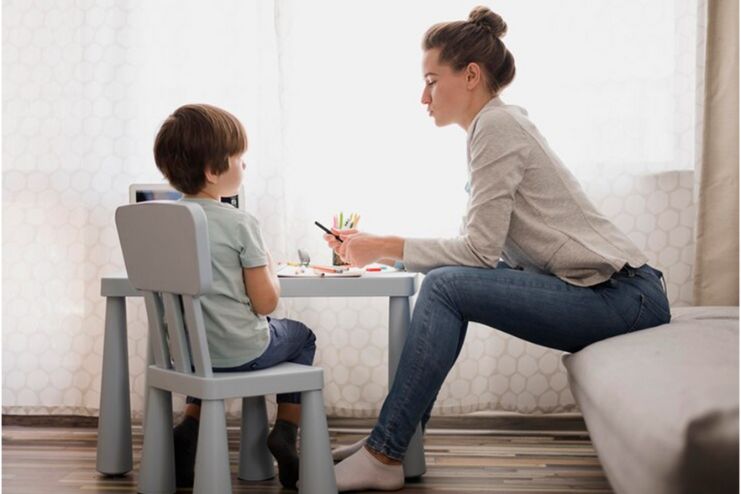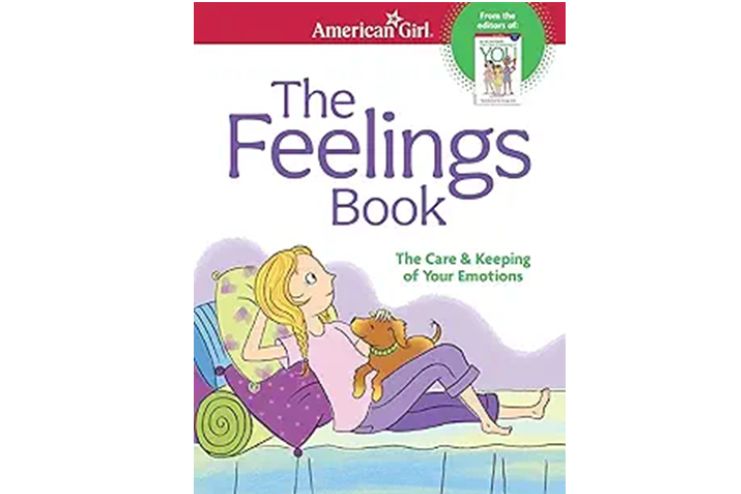Affiliate Disclaimer
Some links in this article are affiliate links. We may earn a small commission if you make a purchase through these links, at no extra cost to you. We only recommend products we find useful to our readersTalking to your kids about mental health is one of the most important conversations you can have as a parent. It helps them build emotional resilience, understand their feelings, and know that it is okay to ask for help if they need it.
Mental health conversations are not just for times of crisis but are essential to creating an environment in which kids feel safe discussing their emotions openly.
Breaking the stigma of mental health starts at home. You are teaching your children early on to focus on their emotional well-being and to have healthy mechanisms in place for handling life’s situations, be it managing anxiety, helping them work through challenges, or simply making sense of what’s going on in their emotions.
This article will focus on when and how to discuss mental health issues with children, provide some practical communication tips, and help parents recognize warning signs that professional support might be needed. Let’s create a world where emotional well-being is a natural and celebrated part of growing up.
When and Why to Talk

Why Mental Health Conversations Matter
Kids are often confused or unable to express their feelings, which may cause frustration or behavioral changes. Talking openly about mental health normalizes emotions and teaches kids that it is okay to seek help. This can prevent long-term issues and promote resilience, self-awareness, and healthy relationships.
When to Talk to Your Kids About Mental Health
The best time to discuss mental health with your child is when they feel comfortable and safe. It’s not a matter of waiting for the “right” moment but seeing the opportunity in every mundane conversation. Here are some natural openings:
- Behavioral Changes: If your child appears withdrawn, irritable, or anxious, simply ask how they feel. For example, you might say, “I’ve noticed you’re quieter than usual. Is something bothering you?” This can convey a message of concern without intruding on the child’s feelings.
- Life Events: Major transitions, such as starting a new school, moving to a new place, or experiencing a loss, can bring up emotions kids may not know how to process. Use these moments to ask questions like, “How are you feeling about this change?” or “Is there anything you’re worried about?”
- Everyday Moments: Casual settings, like car rides, bedtime routines, or family meals, can make these conversations feel less intimidating. Saying something like, “I’ve been thinking about how important it is to talk about feelings. How was your day today?” can open the door to meaningful discussions.
Timing also matters. Choose moments when your child is relaxed and not hurried. Avoid raising serious topics when they are drowsy, distracted, or upset. The more you bring mental health into conversation, the more you create a space where such challenges can be addressed as they come up.
Start these conversations early. Children will be more apt to seek help and develop more substantial emotional intelligence if emotions are discussed within the home they grow up in. Remember, it is not about having all the answers but more about letting them know they can always come to you.
Also, Read: How to Teach Your Kids About the Importance of Personal Hygiene
Tips for Effective Communication

-
Create a Safe Space
Make your child feel comfortable and assure them they will not be judged. Be present in these conversations by maintaining eye contact, offering a warm tone, and eliminating distractions like phones or TVs.
Let them know it is okay to share anything without fear of criticism.
-
Age-Appropriate Language
Using words that best fit their development. For kids: “sad, mad, or worried.” You can get even more specific on emotions and psychological issues with a teen, discussing “stress, anxiety, depression,” etc., in terms to which they would ascribe.
Phrasing the topic in a language that makes the most sense to how they perceive life.
-
Ask Open-Ended Questions
Encourage your child to express themselves freely. Instead of “Are you okay?” try questions like, “What made you feel that way today?” or “Can you tell me more about that?” These questions invite deeper conversations and help your child feel heard.
-
Validate Their Feelings
Acknowledge their feelings without invalidating or diminishing them. You might say, “I understand why you are upset,” rather than, “It’s no big deal.” Although their concerns might seem minor to you, they matter to them. Validation builds trust and helps your child feel heard.
-
Be a Good Listener
Give your full attention to your child when they are speaking. Avoid interrupting or jumping in with solutions right away. Instead, nod, ask follow-up questions, and repeat what they’ve said to show you’re genuinely listening.
For example, “It sounds like you’re feeling overwhelmed with school. Let’s talk about how we can make it easier.”
-
Stay Calm and Supportive
If your child shares something that surprises or worries you, remain calm. Reacting with anger or panic may discourage them from opening up. Offer reassurance, saying things like, “Thank you for telling me. I’m here to help you through this.”
-
Be a Role Model
Speak to your child about how you handle your emotions. For example, “I was stressed today at work, so I went for a short walk to clear my head. It made a difference.” By modeling good emotional behaviors, you will teach your child to control his or her feelings.
Signs of Mental Health Struggles in Kids

Pay attention to emotional, behavioral, and physical signs indicating your child is struggling. These include:
- Emotional Indicators: Frequent sadness, mood swings, or excessive worry. Your child might seem unusually sensitive, cry often, or feel hopeless.
- Behavioral Changes: Difficulty concentrating, withdrawing from friends, or acting out. Watch for sudden changes in their academic performance, social habits, or overall demeanor.
- Physical Symptoms: Difficulty sleeping, stomachaches, or headaches without an apparent cause. Some children may also experience changes in appetite or energy, such as eating more or less than usual or seeming to be constantly tired.
- Avoidance Behaviors: Avoiding school, activities, or situations they once enjoyed can indicate underlying emotional struggles. This might include feigned illness to skip school or reluctance to participate in family events.
Early recognition of these signs will allow you to support them before problems grow too big. Through open communication and observation, you can easily track when your child needs exceptional support.
Also, Read: Raising Kids with Healthy Eating Habits in a Fast-Food World
Encouraging Emotional Expression

Help your child express his emotions by:
-
Creative Outlets
Drawing, journaling, or storytelling can help kids express emotions they might not say out loud. Encourage them to create a feelings chart or keep a diary where they can record their thoughts and emotions. Role-playing or using toys to act out scenarios can be helpful for younger children.
-
Model Healthy Emotional Habits
Share your emotions in a developmentally appropriate way to demonstrate that it’s safe to talk about feelings. For example, you could say, “I was feeling frustrated today, but some deep breaths helped.”
Modeling openness around your emotions will help normalize the expression of emotions and give them tools for constructive expression and management of feelings.
-
Teach Coping Skills
Together, practice techniques like deep breathing, mindfulness, or problem-solving. For example, teach them how to do belly breathing by placing a hand on their stomach and feeling it rise and fall with each breath.
Introduce mindfulness exercises such as focusing on their five senses or guided meditations designed for kids. Also, help them brainstorm solutions to challenges they face, showing that there are actionable steps they can take to feel better.
-
Encourage Verbal Expression
Tell your child it is ok to name their feelings and talk about them. Phrases such as “I am feeling angry because.” or “I am sad because.” can help them articulate feelings rather than internalize them. Provide phrases or prompts to get them started if they are unsure how to express themselves.
Fostering emotional expression helps children process their feelings healthily, builds resilience, and strengthens your bond.
When to Seek Professional Help
Sometimes, professional support is necessary. Consider consulting a therapist or pediatrician if your child:
- Exhibits severe changes in behavior or mood
- Talks about self-harm or expresses hopelessness
- Struggles to manage daily activities due to anxiety, depression, or other emotional challenges
Normalize therapy as a helpful tool rather than a last resort. Help them understand that it is all right to seek help and that visiting a therapist is no different from visiting a doctor for your mind.
Parental Role in Emotional Well-Being

As a parent, your behaviors set the benchmark for emotional health. Here’s how you can set the proper examples:
- Be Open About Your Emotions: Share your feelings and coping strategies to show that emotions are a natural part of life. For instance, you might say, “I felt nervous about my meeting today but practiced what I wanted to say, and it went well.” This illustrates that it is all right to feel emotions and that you take action to build on them.
- Practice Self-Care: Engage in activities that recharge you, such as exercising, meditating, or spending time with friends. When kids see you prioritize self-care, it makes sense, and they learn to prioritize their well-being.
- Stay Patient: Kids need little time to develop emotional awareness. Credit little milestones, like identifying a feeling or a coping skill. Praise efforts by saying, “I’m so proud of you for talking about how you feel.” Let your child know that you are always there for him/her, no matter how long it takes.
- Be Consistent: Create routines that include emotional check-ins, such as asking about their day during dinner or before bedtime. Consistency reinforces the importance of mental health and creates opportunities for open conversation.
- Show Empathy: Put yourself in your child’s shoes and validate their experiences. If they’re upset about something minor, respond with understanding instead of dismissal. Say, “That sounds hard. How can I help?”
Show healthy emotional behaviors to your child and provide a stable source of support, helping them develop lifelong emotional well-being.
Resources for Parents and Kids

Use tools and resources to guide your journey:
- Books: “The Feelings Book” by Todd Parr (for younger kids) or “What to Do When You Worry Too Much” by Dawn Huebner (for older kids).
- Apps Calm, Headspace for Kids, and Smiling Mind offer kid-friendly mindfulness exercises and meditation.
- Community Support: Seek support from local mental health organizations or school counselors.
Conclusion
Talk to your kids about mental health. This is one of the best ways you can support their emotional growth. Fostering open communication, teaching coping skills, and seeking help when needed empower your child to thrive emotionally. Remember, these conversations don’t have to be perfect; they just need to happen.
Start today and build a foundation of understanding, trust, and support for your child’s mental health journey.
References
- https://www.nami.org/your-journey/kids-teens-and-young-adults/kids/how-to-talk-to-your-child-about-their-mental-health/
- https://www.chop.edu/health-resources/parents-tips-talking-your-child-about-mental-health
- https://www.hellobrightline.com/blog/9-tips-for-talking-to-kids-and-teens-about-mental-health
- https://www.samhsa.gov/mental-health/what-is-mental-health/how-to-talk/parents-and-caregivers
- https://www.unicef.org/parenting/health/how-to-talk-to-kids-mental-health
- https://www.youngminds.org.uk/parent/how-to-talk-to-your-child-about-mental-health/
In this Article



















